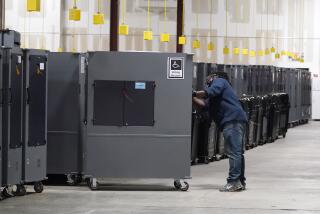Japan’s Scandal Toll as Probe Ends: 16 Indicted
- Share via
TOKYO — The final tally in payments, indictments and careers soiled by the massive influence-buying operations of a Japanese information and real estate company became clear Monday.
Tokyo District Chief Prosecutor Yusuke Yoshinaga finalized the list of people indicted at 16 as he announced the conclusion of a 260-day investigation into the scandal that has paralyzed the political world and tarnished the image of Japanese business as well.
The number was exactly the same as the indictments prosecutors brought against politicians and business executives in Japan’s previous political scandal, the Lockheed affair, in which the Burbank, Calif., firm bribed incumbent Prime Minister Kakuei Tanaka in 1972 to persuade All Nippon Airways to purchase Lockheed L-1011 Tristars.
Tanaka, although crippled by a stroke in 1985, retains his seat in Parliament while appealing a 1983 conviction for accepting a $1.8-million bribe from Lockheed.
Four new indictments revealed Monday were balanced by an announcement that four people arrested earlier would not be indicted.
Termination of the investigation showed that 1.1 billion yen, or $7.7 million, in funds were involved in the influence-buying by Recruit Co. Profits in preferential stock trading were offered to 159 politicians, business people, journalists and bureaucrats. The firm also made political donations to 30 politicians.
The benevolence, concentrated in the period between 1982 and 1987 when former Prime Minister Yasuhiro Nakasone was in office, involved figures in four of Japan’s five major political parties. Only the Communist Party emerged untainted.
Nakasone, outgoing Prime Minister Noboru Takeshita and three ruling Liberal Democratic Party leaders considered as future contenders for prime minister all received Recruit favors, although no violations of law were found, Yoshinaga said.
Forced to Resign
A total of 53 people in business, journalism and politics, including Takeshita and three of his Cabinet members, were forced to resign because of discoveries that they had received funds from Recruit.
Although the scandal initially focused on the stock-trading favors Recruit offered influential figures, public resentment grew so strong as the revelations piled up that the mere receipt of any Recruit money, however legal, became cause for scandal.
Only Hiromasa Ezoe, Recruit’s founder, and three of the firm’s executives, two politicians, three businessmen and three bureaucrats were indicted on bribery charges.
The new indictments announced Monday involved four secretaries of three ruling party leaders--Secretary General Shintaro Abe, former Finance Minister Kiichi Miyazawa, and former Agriculture Minister Mutsuki Kato. The aides, Yoshinaga announced, were fined $1,400 each for violations of the Political Fund Control Law.
Yet to be determined is the political toll of the scandal.
Voters, who also have been upset by a 3% consumption tax that was imposed as the Recruit revelations were unfolding, will have the first chance to respond when balloting is held for half of the seats in the upper house of Parliament on July 23.
More to Read
Sign up for Essential California
The most important California stories and recommendations in your inbox every morning.
You may occasionally receive promotional content from the Los Angeles Times.













